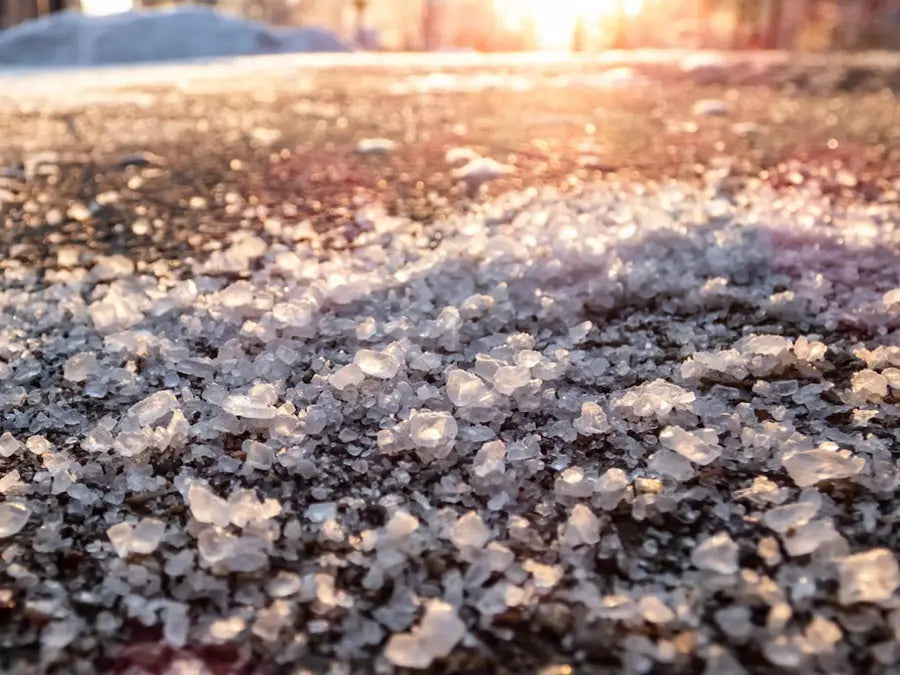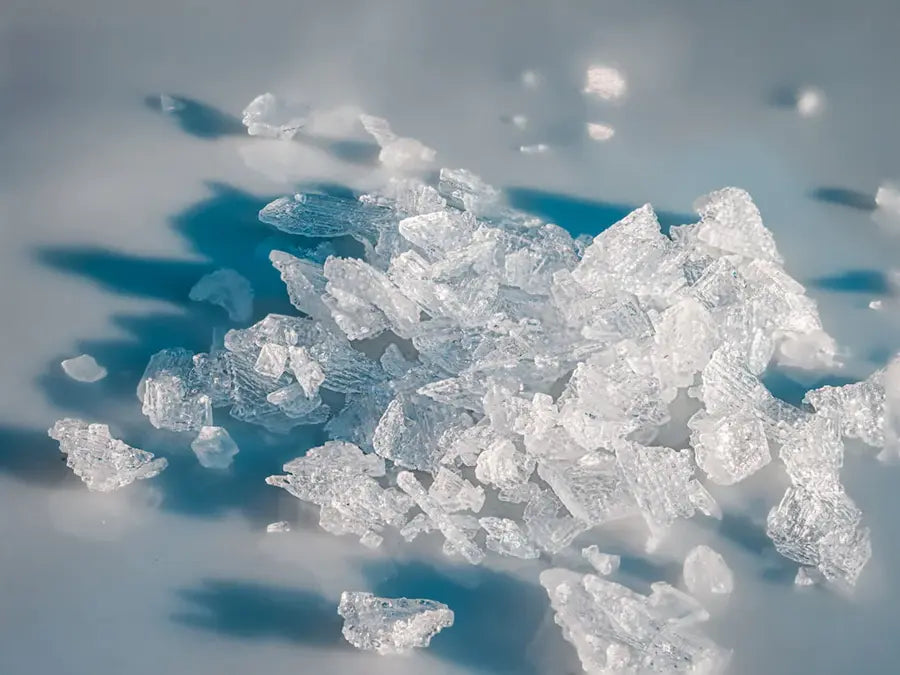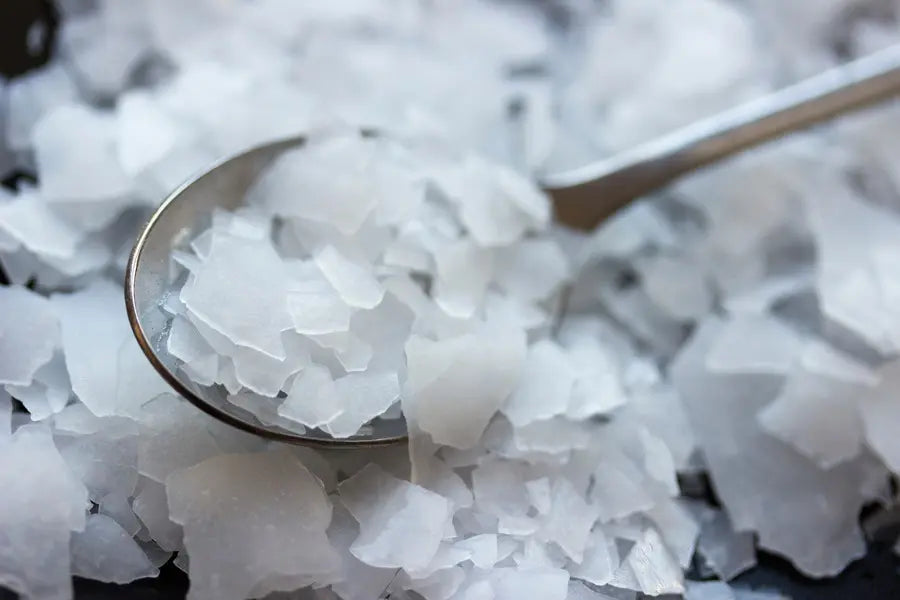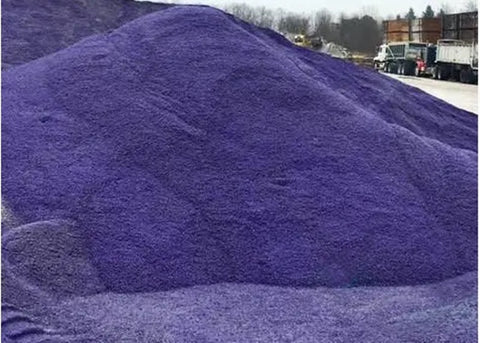
What Type of Salt Is Used on Roads?
When it comes to winter road maintenance, choosing the right salt is crucial for keeping roads and lots safe. And because it’s so important, we’re breaking down what road salt is, how it works, and the different types of bulk salt that can be used to keep drivers and pedestrians safe no matter what winter brings. Discover the benefits of various salts, including their effectiveness, environmental impact, and cost-effectiveness.
What Is Road Salt?
Everyone talks about road salt, but what is it? What is road salt made of and what kind of salt is road salt? Road salt is halite. The term typically refers to sodium chloride but can be a different hygroscopic salt like magnesium chloride or calcium chloride. Road salt production is different from that of regular table salt, as it is not purified after evaporation or mining. It often contains certain chemical additives for other purposes, like making it more effective in colder temperatures.
How Does Road Salt Work?

But how does road salt work? It’s a simple chemical process. The salt used for de-icing serves to lower the melting point of the snow or ice, in other words, it lowers the freezing point of the water. Essentially, it allows for ice and snow to melt at colder temperatures and disallows it from freezing following its melting.
After absorbing heat and moisture from its surroundings, salt dissolves in the snow and breaks down into two ions, a chloride ion, and a sodium ion (if you are using sodium chloride), which then disperse the water molecules. Simply put, the water molecules are being pushed apart, making it more difficult for ice to form. As the ice does not immediately reform, there is more time for manual snow removal, such as the use of plows.
Road salt can also prevent ice and snow from adhering to surfaces, making the manual removal of any remnants even easier. Overall, the use of salt is very effective in lowering the risk of accidents, both vehicular and pedestrian. Using it in parking lots and on sidewalks and roads can help decrease danger.
Common Types of Road Salt

With so many different kinds, it's important to know what type of salt is used for roads under specific circumstances and factors like temperature, application area, and level of precipitation. So what are the differences between the different kinds of road salt?
Sodium Chloride
Easily the most common type of road salt is sodium chloride (NaCl), or table salt. Sodium chloride is typically a white or dark gray color and is especially popular because of its ready availability, and even more so, its affordability.
This rock salt is especially good for adding traction to roads, pavements, and other similar surfaces. It is most effective and fast-acting in temperatures between 15º and 20ºF but will work in any temperature above 5ºF.
Magnesium Chloride

Magnesium chloride blends are another type of salt used for roads that work at lower temperatures than sodium chloride alone. Oftentimes salt blends (sodium chloride treated with magnesium chloride) also include corrosion inhibitors and are dyed a bright color for easier application.
Another benefit that makes magnesium chloride so popular is its environmental friendliness. It is less corrosive to metals than some other salts and is less harmful to plants and animal life.
Calcium Chloride
Calcium chloride is a commonly used salt in areas that experience extreme cold, as it can be incredibly effective in temperatures as low as -25ºF. This, coupled with its ability to prevent further ice from forming, makes calcium chloride a popular choice. Calcium chloride is incredibly fast-acting, working to melt ice immediately, and has a large melting capacity.
Potassium Chloride
Potassium chloride is a somewhat popular choice because it is not harmful to plant life, pets, and other vegetation. However, it is not the most effective option, as it requires a higher working temperature to be truly effective and has been known to corrode metals and roads. This is a huge detriment to the infrastructure and surrounding environment and should be considered before application.

Looking for Bulk Rock Salt Solutions?
Transform your winter maintenance with Ninja De-Icer, your go-to destination for a range of salts!
Explore Our ProductsBest Rock Salt for Roads
The best choice of road salt largely depends on road management needs and specific conditions like temperature, environmental concerns, and desired effectiveness. Sodium chloride is popular for its affordability and traction enhancement, effective above 5ºF. Magnesium chloride, less corrosive and more eco-friendly, works quickly even in colder temperatures. Calcium chloride excels in extreme cold, down to -25ºF, with fast action and low corrosiveness. Potassium chloride, while safe for vegetation, is less effective and potentially corrosive.
| Type of Road Salt | Characteristics | Temperature Efficiency | Environmental Impact |
|---|---|---|---|
| Sodium Chloride | Most common and affordable, adds traction with, a dark gray color. | Effective between 15ºF and 20ºF, works above 5ºF. | Elevated chloride levels in soil and water, harm to aquatic life, and infrastructure deterioration. |
| Magnesium Chloride | Will absorb moisture from the air, not the best to use in high moisture events. | Effective in colder temperatures. | Less corrosive to metals, and less harmful to plants and animal life. |
| Calcium Chloride | Ideal for extreme cold, and prevents ice formation, and fast melting action. | Effective as low as -25ºF. | Environmentally safe according to EPA, not highly corrosive to roads. |
| Potassium Chloride | Common in fertilizer, safe for plants and pets. | Requires higher temperatures to be effective. | Can corrode metals and roads, potentially detrimental to infrastructure. |
Explore Premium De-Icing Options for Winter Roads
When it comes to winter road maintenance, choosing the right road salt product is essential. Explore top-notch road salt products available, each with its unique characteristics and benefits.
Traditional Bulk Salt
Traditional Bulk Salt is a coarse, white rock salt composed of sodium chloride. It is obtained from underground bedded salt deposits through physical mining. This salt is highly effective down to 5°F and is ideal for use on highways, roadways, and parking lots. It offers several benefits, including cost-effectiveness compared to buying bagged rock salt, better control over product supply, and improved seasonal planning. Complying with ASTM D 632, Type 1, Grade 1 specifications, Traditional Bulk Salt provides a reliable solution for ice control.
Thunder Melt Treated Salt


Thunder Melt Treated Salt is a bulk salt formulated with both ASTM-1 grade rock salt and calcium chloride for the effortless melting of ice and snow. Thunder Melt boasts superior power in freezing conditions, working in temperatures as low as -16ºF. It’s also dyed bright violet for even spreading and has a corrosion inhibitor coating to protect infrastructure and the environment.
ClearLane Treated Salt
ClearLane Treated Salt is a potent blend of sodium chloride and magnesium chloride. Effective even in temperatures below 0°F, the dyed ice salt provides even spreading on concrete and asphalt, melting ice and snow with ease. Formulated with a PNS-approved corrosion inhibitor, it helps protect metals and concrete from damage. This pre-wet sodium and magnesium chloride mixture doesn’t scatter or bounce, ensuring every granule is working to tackle ice.
Find the Perfect Road Salt Solution with Ninja De-Icer
Choosing the right road salt for your municipality, facility, or commercial property is vital. Armed with a deeper understanding of each option, it's time to find the ideal bulk rock salt solution. Look no further than Ninja De-Icer, a trusted supplier with a wide selection of high-quality road salts. Our experienced team is ready to assist you. Contact us today to get a quote and have all your questions answered by our dedicated experts!



